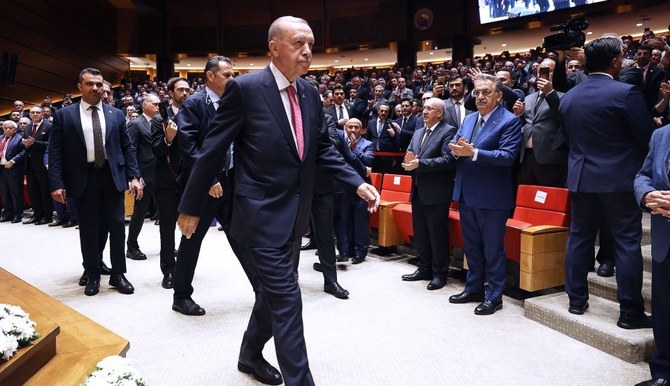
With fewer than 100 days to go until the Nov. 5 election in the US, campaigning is about to get red hot, even radioactive. It has already been a momentous campaign, even without competitive primaries for both parties. A candidate has been shot at. Another has stood down. The levels of polarization are precarious, with the middle ground a no man’s land between two warring factions.
The rest of the world is watching. The fascination is sharpened because two different Americas are competing for power and other powers will have to adapt to whatever vision prevails. An isolationist or an internationalist US? A US that works with allies versus one that sticks rigidly to its own self-interest.
What might this mean for the Middle East and, in particular, for the crisis of the moment, Israel-Palestine? In past elections, Palestinians would often say that it would make little difference who was in the White House, and they watched as candidates competed to embrace Israel. For sure, none of the potential contenders will be dancing dabke and quoting Mahmoud Darwish while wearing a “Free Palestine” T-shirt, but their visions and direction of travel will be markedly different.
The decision of President Joe Biden to stand aside has shaken up the race. All of a sudden, it is Donald Trump who has to answer questions about his age. He looks like the one fighting off the insurgent, not the other way round. Assessing what Trump will do with the Middle East, as with anything with him, is tough. During his first term, he was the most pro-Israeli, anti-Palestinian American leader in history. Yet the caveat to this was his falling out with Israeli Prime Minister Benjamin Netanyahu. Their meeting last week in Mar-a-Lago was their first in almost four years and Trump even had to deny a rift, saying that it “was never bad … we’ve always had a very good relationship.” Also, just how much appetite will Trump have for dishing out billions of dollars of US taxpayers’ money for a foreign government? This is not something he typically likes doing.
But as the polls now narrow to margin of error levels, one has to assess how a Kamala Harris presidency might look for the Middle East. She definitely looks likely to be — not least after the Obamas’ endorsement — the Democratic Party candidate. She has the momentum.
Much was made of Harris not being present for last week’s Netanyahu jamboree at Congress. Would she like to have been part of the dozens of standing ovations? Clearly not. After they did meet in private, her comments were direct and not entirely to Netanyahu’s liking. She called it a “frank and constructive meeting,” diplomatic code for tense.
Even before becoming a presidential election candidate, Harris had sounded more empathetic than Biden.
Chris Doyle
Harris also said: “I will not be silent … It is time for this war to end.” Netanyahu, who opposes any Palestinian state, would have hated her saying: “A two-state solution is the only path that ensures Israel remains a secure Jewish and democratic state, and one that ensures Palestinians can finally realize the freedom, security and prosperity that they rightly deserve.” Few US leaders have talked about Palestinian freedom and security, so to do this in the wake of a face-to-face meeting with Netanyahu was notable.
Even before becoming a candidate, Harris had sounded more empathetic than Biden. Back in March, she called for an immediate ceasefire. She was clear: “People in Gaza are starving (being starved, to be precise). The conditions are inhumane and our common humanity compels us to act.”
The empathy is there but will a change of tone and more humanitarian aid be enough? Many Arab Americans want action and, above all, the end of US complicity in the Gaza genocide by shutting off the US weapons pipeline that permits it to continue.
Yes, this is an exercise in straw-clutching. Harris knows she has to win Michigan, a key swing state that has a large Arab American population. She has to be more energetic, more determined than Biden and a little tougher on Israel, but not an opponent. She will, most believe, remain within the traditional Democratic consensus. She will not back the International Criminal Court against Israel, for example. In this sense, her stance will be more predictable than Trump’s.
That said, Netanyahu and his coalition will fret over a Harris presidency. Netanyahu has once again been pretty clear that he prefers Republicans over Democrats; Trump over Biden or Harris. “There will be no halt to the war, Madame Candidate,” Netanyahu ally Itamar Ben-Gvir, Israel’s racist national security minister, posted on X.
Biden may have to cede a degree of policymaking to Harris to help her win in November. She will have a more central role and will want a higher profile on the world stage. Her stance matters from here on in.
This electoral hate-fest has just been given a huge jolt and Trump knows it. The incredible contrast of the two likely candidates in terms of age, gender, race, experience, world outlook, and politics serves to sharpen the divisions. It is the Palestinians who fear that they will once again be one of the primary victims of this inglorious jamboree.
• Chris Doyle is director of the Council for Arab-British Understanding in London. X: @Doylech












